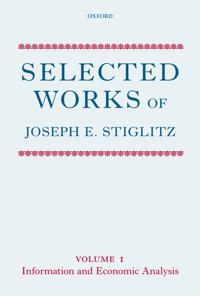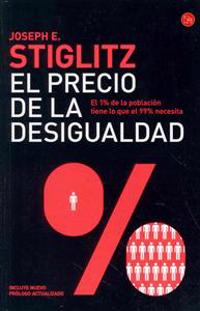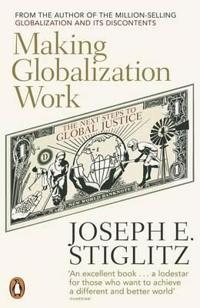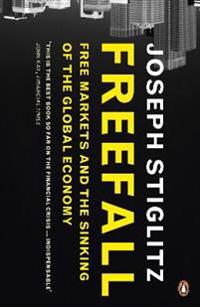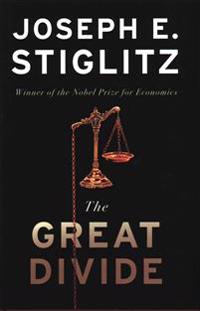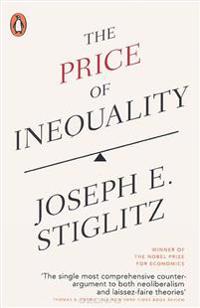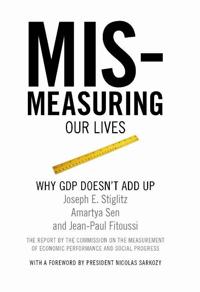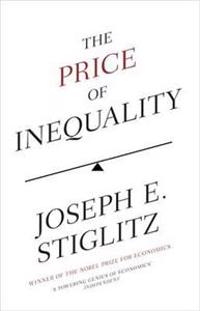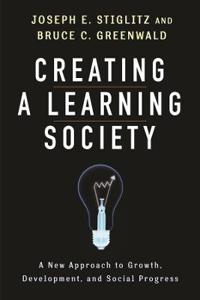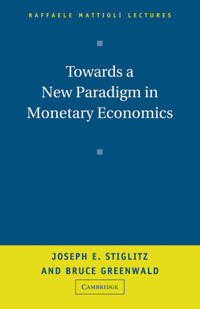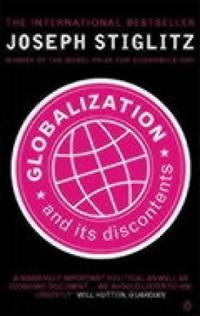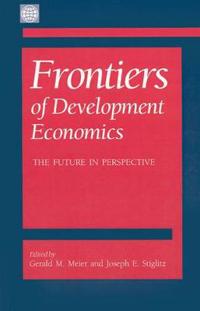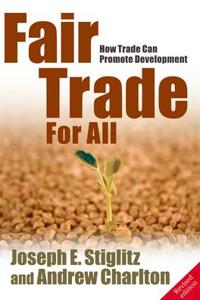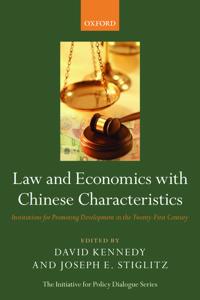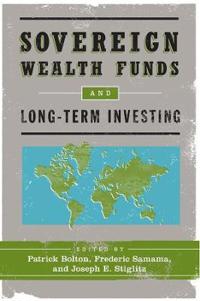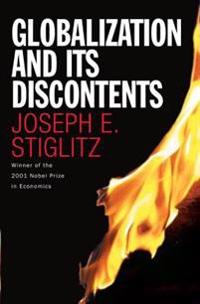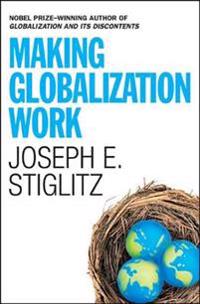Selected Works of Joseph E. Stiglitz (Inbunden)
avJoseph E. Stiglitz
ISBN: 9780199533701 - UTGIVEN: 200812This is the first volume in a new, definitive, six-volume edition of the works of Joseph Stiglitz, one of today's most distinguished and controversial economists. Stiglitz was awarded the Nobel Prize in Economics in 2001 for his work on asymmetric information and is widely acknowledged as one of the[...]
Selected Works of Joseph E. Stiglitz (Inbunden)
avJoseph E. Stiglitz
ISBN: 9780199533718 - UTGIVEN: 2013-05-05The second in a series of six volumes containing a selection of Joseph Stiglitz's most important and widely cited work. Volume I set out the basic concepts underlying the economics of information. Volume II extends these concepts and applies them to a number of different settings in labour, capital,[...]
El Precio de La Desigualdad (Häftad)
avJoseph Stiglitz, Joseph Eugene Stiglitz
ISBN: 9788466327817 - UTGIVEN: 2010-10While the top 1 percent of the population enjoy the best health care, education, and benefits of wealth, they fail to realize that "their fate is bound up with how the other 99 percent live." The consequences of inequality are known: higher crime rates, sanitary issues, lower levels of education, so[...]
Making globalization work (Pocket)
avJoseph Stiglitz
ISBN: 9780141024967 - UTGIVEN: 200709From Nobel Prize winner Joseph Stiglitz, "Making Globalization Work" gives real, concrete ways to deal with third world debt, make trade fair and tackle global warming. In "Globalization and its Discontents" Joseph Stiglitz changed the views of the public and world leaders alike by showing why globa[...]
Freefall (Häftad)
avJoseph Stiglitz
ISBN: 9780141045122 - UTGIVEN: 201010Out of the crisis of our times, Joseph Stiglitz's "Freefall: Free Markets and the Sinking of the Global Economy" is a convincing, coherent and humane account that goes to the heart of how we run our societies. When the world economy went into freefall, so too did our unquestioning faith in markets. [...]
The Price of Inequality (Häftad)
avJoseph Stiglitz
ISBN: 9780718197384 - UTGIVEN: 201304America currently has the most inequality, and the least equality of opportunity, among the advanced countries. While market forces play a role in this stark picture, politics has shaped those market forces. In this best-selling book, Nobel Prize-winning economist Joseph E. Stiglitz exposes the effo[...]
The Price of Inequality (Inbunden)
avJoseph Stiglitz
ISBN: 9781846146930 - UTGIVEN: 201206The top 1 percent have the best houses, the best educations, the best doctors, and the best lifestyles, but there is one thing that money doesn't seem to have bought: an understanding that their fate is bound up with how the other 99 percent live. Throughout history, this is something that the top 1[...]
Fungerande globalisering (Häftad)
avJoseph Stiglitz
ISBN: 9789171732590 - UTGIVEN: 200710Joseph E. Stiglitz, nobelpristagare i ekonomi, diskuterar i den här boken vad som kan göras för att globaliseringen ska fungera, för att den ska kunna komma alla till del. Den ekonomiska globaliseringen har gått snabbare än den politiska, den har rusat förbi förmågan att hantera konsekvense[...]
Creating a Learning Society (Inbunden)
avJoseph E. Stiglitz, Bruce C. Greenwald, Joseph E. Stiglitz
ISBN: 9780231152143 - UTGIVEN: 2014-05It has long been recognized that most standard of living increases are associated with advances in technology, not the accumulation of capital. Yet it has also become clear that what truly separates developed from less developed countries is not just a gap in resources or output but a gap in knowled[...]
Principles of Microeconomics (Pocket)
avJoseph E. Stiglitz, Carl E. Walsh, Joseph E. Stiglitz
ISBN: 9780393168181 - UTGIVEN: 2005-12Co-written by Joseph Stiglitz, winner of the Nobel Prize for his research on imperfect markets, and Carl E. Walsh, one of the leading monetary economists in the field, Principles of Microeconomics is the most modern and accurate text available.[...]
Towards a New Paradigm in Monetary Economics (Pocket)
avJoseph E. Stiglitz, Bruce Greenwald, Joseph E. Stiglitz
ISBN: 9780521008051 - UTGIVEN: 2003-09Towards a New Paradigm for Monetary Economics presents a pioneer treatment of critical topics in monetary economics. Unlike the prevailing monetary theory, this book focuses not on the role of money in facilitating transactions, but on the role of credit in facilitating economic activities more broa[...]
Globalization and Its Discontents (Storpocket)
avJoseph E. Stiglitz
ISBN: 9780141010380 - UTGIVEN: 200304In this hugely controversial book, the most recent winner of the Nobel Prize for Economics argues that though globalization should be a powerful force for good, it has been badly mishandled by the West (especially its lead institutions, the World Bank and the IMF) and that the anti-globalizing prote[...]
Frontiers of Development Economics: The Future in Perspective (Inbunden)
avJoseph E. Stiglitz, Gerald M. Meier, Nicholas Stern
ISBN: 9780195215922 - UTGIVEN: 2002-04With contributions from 35 leading economists, this forward-looking book explores the future of development economics against the background of the past half-century of development thought and practice. Outstanding representatives of the past two generations of development economists assess developm[...]
Fair Trade for All (Häftad)
avJoseph E. Stiglitz, Andrew Charlton
ISBN: 9780199219988 - UTGIVEN: 200707How can the poorer countries of the world be helped to help themselves through freer, fairer trade? In this challenging and controversial book Nobel prize-winning economist Joseph E. Stiglitz and his co-author Andrew Charlton address one of the key issues facing world leaders today. They put forward[...]
Fair Trade for All: How Trade Can Promote Development (Inbunden)
avJoseph E. Stiglitz, Andrew Charlton
ISBN: 9780199290901 - UTGIVEN: 2005-12-06Law and Economics With Chinese Characteristics (Inbunden)
avDavid Kennedy, Joseph E. Stiglitz, David Kennedy
ISBN: 9780199698547 - UTGIVEN: 2013-04Policymakers and economists largely agree that 'rule of law' and property rights are essential for a sound economic policy, particularly for most developing countries. But it is becoming increasingly apparent that transplanting legal frameworks from one society to another doesn't work - even though [...]
Law and Economics with Chinese Characteristics (Häftad)
avJoseph E. Stiglitz
ISBN: 9780199698554 - UTGIVEN: 201303Policymakers and economists largely agree that 'rule of law' and property rights are essential for a sound economic policy, particularly for most developing countries. But it is becoming increasingly apparent that transplanting legal frameworks from one society to another doesn't work - even though [...]
Sovereign Wealth Funds and Long-Term Investing (Pocket)
avPatrick (EDT) Bolton, Frederic (EDT) Samama, Joseph E. (EDT) Stiglitz
ISBN: 9780231158633 - UTGIVEN: 2011-11Sovereign Wealth Funds (SWFs) are state-owned investment funds with combined asset holdings that are fast approaching four trillion dollars. Recently emerging as a major force in global financial markets, SWFs have other distinctive features besides their state-owned status: they are mainly located [...]
Whither Socialism? (Häftad)
avJoseph E. Stiglitz
ISBN: 9780262691826 - UTGIVEN: 199604The rapid collapse of socialism has raised new economic policy questions and revived old theoretical issues. In this book, Joseph Stiglitz explains how the neoclassical, or Walrasian model (the formal articulation of Adam Smith's invisible hand), which has dominated economic thought over the past ha[...]
Globalization and Its Discontents (Inbunden)
avJoseph E. Stiglitz
ISBN: 9780393051247 - UTGIVEN: 200206This powerful, unsettling book gives us a rare glimpse behind the closed doors of global financial institutions by the winner of the 2001 Nobel Prize in Economics. Renowned academic economist Joseph E. Stiglitz served seven years in Washington, as chairman of President Clinton's Council of Economic [...]
Making Globalization Work (Inbunden)
avJoseph E. Stiglitz
ISBN: 9780393061222 - UTGIVEN: 200608The Nobel Prize-winning economist and leading critic of globalization offers a fresh new approach to the issue that explains how to restructure an unstable global financial system, how nations can grow economically without damaging the environment, and how to devise a framework for free and fair glo[...]

